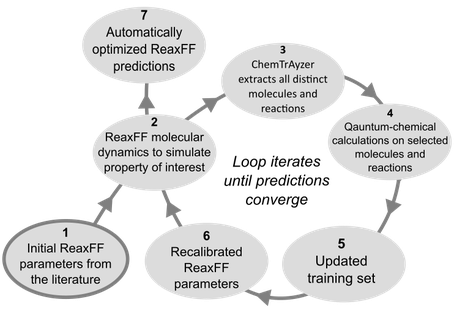Marie Skłodowska-Curie Action ITN AutoCheMo
The Marie Skłodowska-Curie Action "Automatic generation of Chemical Models" will advance new concepts and simulation software for modelling complex reactive systems. Two academic partners (Prof. Verstraelen at Ghent University and Prof. Leonhard at RTWH Aachen) combine their expertise with that of the SME Software for Chemistry and Materials (SCM, Amsterdam, project coordinator) to extended simulation software ChemTrayzer and ReaxFF. Our goal is to automate the arduous task of deriving reaction networks from reactive molecular dynamics simulations and to improve the predictive accuracy of such simulations. The total duration of the project is four years, starting September 2018, but the four ESRs working on the project are employed for three years, each one part at one of the academic partners and for the remaining time at SCM.
The scientific software company SCM, the Center for Molecular Modeling at Ghent University, and the Leonhard group at RWTH Aachen University, who share established collaborations in method development and software implementation as well as in the training of PhD students, pursue the development of new concepts and tools to advance the field of complex reaction systems modelling.
The automatic derivation of complex chemical models from molecular simulations has the potential to become a very cost-effective tool in the design of industrial chemical reactors. This has driven the enormous progress in the field over the past decades but the exploration of complex reaction networks currently still requires an extensive (and sometimes unfeasible) amount of manual labor.
We will surmount these manual bottlenecks by extending established methodologies (ChemTraYzer, ReaxFF and transition state theory) and by addressing their main limitations (scaling towards extended systems, overall reliability and the quantum-mechanical description of anharmonic modes, respectively) with new theoretical models and their corresponding implementations in user-friendly simulation software.
The project contains four well-aimed research-oriented work packages, with one ESR taking the lead in each topic but with plenty opportunities to collaborate and exchange results. Each topic touches upon the expertise of all beneficiaries, yet they all have their own commercial or academic perspective on the project. Research actions are organized in conjunction with local and network-wide training, including academic and industrial specialist courses, transferable skills training, (international) workshops and training-through-research. The training events are dispersed throughout the timeline of the project, which will be an ideal platform for the ESRs to flourish and become future leaders in academic or industrial research.
Objectives
The objectives of AutoCheMo are:
• Objective 1. Development and implementation of tools to automatically analyze reactive dynamics simulations of large molecules and complex mechanisms
• Objective 2. Development and implementation of tools to automatically create more accurate reactive force fields
• Objective 3. Development and implementation of tools that automatically identify (inter)molecular degrees of freedom that require QM treatment of anharmonic motion and that efficiently determine the potential energy hypersurface (PES) based on as few QM calculations as possible
Role of Ghent University
The role of the UGent partner in AutoCheMo is mainly the realization of objective 2. Our expertise will also be used to support the other objectives, through secondments of the ESRs and shorter exchanges.
Website
Contact
Prof. Toon Verstraelen
Department of Physics and Astronomy (WE05)
Phone number: 09/264.65.56
E-mail
